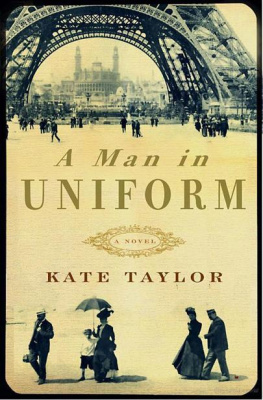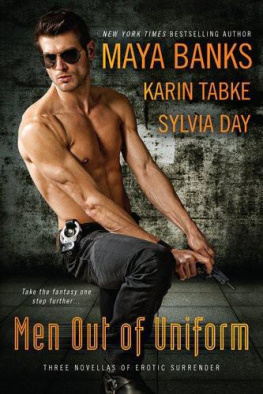Kate Taylor - A Man in Uniform
Here you can read online Kate Taylor - A Man in Uniform full text of the book (entire story) in english for free. Download pdf and epub, get meaning, cover and reviews about this ebook. year: 2010, publisher: Crown Publishing Group, genre: Detective and thriller. Description of the work, (preface) as well as reviews are available. Best literature library LitArk.com created for fans of good reading and offers a wide selection of genres:
Romance novel
Science fiction
Adventure
Detective
Science
History
Home and family
Prose
Art
Politics
Computer
Non-fiction
Religion
Business
Children
Humor
Choose a favorite category and find really read worthwhile books. Enjoy immersion in the world of imagination, feel the emotions of the characters or learn something new for yourself, make an fascinating discovery.
- Book:A Man in Uniform
- Author:
- Publisher:Crown Publishing Group
- Genre:
- Year:2010
- Rating:3 / 5
- Favourites:Add to favourites
- Your mark:
- 60
- 1
- 2
- 3
- 4
- 5
A Man in Uniform: summary, description and annotation
We offer to read an annotation, description, summary or preface (depends on what the author of the book "A Man in Uniform" wrote himself). If you haven't found the necessary information about the book — write in the comments, we will try to find it.
A Man in Uniform — read online for free the complete book (whole text) full work
Below is the text of the book, divided by pages. System saving the place of the last page read, allows you to conveniently read the book "A Man in Uniform" online for free, without having to search again every time where you left off. Put a bookmark, and you can go to the page where you finished reading at any time.
Font size:
Interval:
Bookmark:
Also by Kate Taylor
Madame Proust and the Kosher Kitchen
KATE TAYLOR is an award-winning novelist and journalist. The child of a Canadian diplomat, she was born in France and raised in Ottawa. Her debut novel, Madame Proust and the Kosher Kitchen, won the Commonwealth Writers Prize for Best First Book (Canada/Caribbean Region) and the Toronto Book Award, among others. She also writes about culture for Canadas national newspaper, The Globe and Mail, where she served as theater critic from 1995 to 2003. Kate Taylor lives in Toronto.
Light seeped slowly into the room, awakening him from a half sleep. He shifted his weight on the bed, aware he must move carefully while not conscious enough to think why. Something pressed against his wrist and, as he winced with pain, knowledge flooded back in: the bracelet knocked against the bandage there. Underneath the gauze was an open wound. He had spent another night shackled to his cot.
In the end, the palisade had proved more blessing than curse. It cut off his view to the sea, but the lieutenant now ordered the guards to take him down to the little beach at one edge of the island for exercise each morning. He was left to pace the small strip of sand or simply sit there staring out at the relentless waves while his guards perched on the rocks behind him, their rifles resting across their knees.
Those days some months before, as the stakes had risen around his hut, he had soon realized the palisades potential: at any hour other than high noon, it provided shade away from the hot metal of the shed and its little porch. By late afternoon it offered an entire corner of coolness where he soon took to sitting for hours. Eventually, the lieutenant allowed him to move his desk there, and even ordered the erection of a canvas sunshade over the top of it to protect him in the mornings.
The lieutenant was unrelenting, however, on the subject of the shackles. It was as though, the prisoner thought, the man had to make a report all the way back to Paris: as ordered, the prisoner is kept shackled at night and under armed guard during the day. He need not mention the ways in which he eased the prisoners situation as long as he followed his orders.
The first night they had pinned him to his cot spread-eagled, each arm raised above his head and locked to either side of the metal frame. The position quickly became excruciating. He had managed, by dint of digging in his heels and bending his knees, to inch his trapped body into a more upright position and so lessen the strain on his arms, but by morning his muscles were in spasm.
The next night, he pleaded with them in his cracked voice to allow him to lie on his side with his hands in a prayer position locked together on the frame. It was a position he could hold all night without agony but, repeatedly jolted back to consciousness by the rubbing of the shackles, he never slept deeply again. When it was not his bracelets that pained him, it was the insects that he was powerless to swat from his face. One fly could keep him awake all night. A stinging mosquito could render him half mad.
His guards did not complain when, in the afternoons, he fell asleep without his shackles, his body stretched along the length of the palisade.
Sores soon began to appear on his wrists, where the metal rubbed the skin raw, and his guards kept up a continual campaign of bandages. He wondered at their solicitousness until it occurred to him that, if the wounds became infected and blood poisoning set in, he might die. Not on the lieutenants watch, the prisoner concluded: the man had been ordered to guard a living prisoner, and that he did.
There was a sound now at the door. The guard was coming to unlock him and give him his bread. The man stepped into the room with more energy than usual, his bearing more upright. The reason followed on his heels: the lieutenant entered with a second guard who carried a duffel bag.
These latter two stood and watched as the first guard unlocked the shackles. The prisoner drew his hands to his body slowly and then stiffly pushed himself to sitting.
Take off your pants, said the lieutenant, pulling some undergarments from the bag and tossing them on the bed. Put these on.
The prisoner began to tug at his loose trousers but then stopped and cocked his head toward the corner of the room.
What is it, man?
He wants to pee, Lieutenant.
Oh. Go ahead.
He crossed to the bucket and simply let his trousers drop. One of the guards snickered.
Silence! Pass him the underwear.
When he was finished, he stepped out of the trousers at his ankles, took the undergarments from the guard, and put them on.
As he stood there, wearing the new underwear and his old, stained canvas shirt, the lieutenant pulled a tunic and pants from the bag and unfolded them on the cot. The tunic bore no insignia, but the prisoner recognized the clothes instantly for what they were: not the tropical khakis the men here wore, but the blue serge uniform of the army back in France. Slowly, with a kind of wonder, he pulled on the pants and the tunic, his cramped fingers fumbling with the familiar brass buttons. It was an action that once, in some other life, he had repeated unthinkingly thousands of times.
Boots? asked the lieutenant, glancing about. He still has boots?
No laces, said the first guard, picking up a well-worn pair of boots from one corner of the tiny room. The laces had been taken away the day he arrived, which did not matter much since he always went barefoot.
Give him your laces. You can get more later.
The guard did not look happy at the order but bent down and began pulling his laces out of his own boots. The second guard threaded them through the prisoners boots and passed them to him. The prisoner sat down on the cot and began to pull one on, but quickly drew back his foot. He turned the boot upside down and shook it. A large beetle fell out and scuttled away. The guards laughed.
Hurry! barked the lieutenant. Help him tie the laces.
Once the prisoner was shod and standing before him, the lieutenant drew a cap out of the bag and handed it to him.
The boat from the mainland docked last night and the captain wants to sail as soon as possible. You are to return to France.
The prisoner croaked out one word. How?
You had better start using your voice, man. Youll need it to plead your case. Your wife has won you an appeal.
Merci, mon Lieutenant. Dreyfus drew himself up as best he could and saluted, bringing his bandaged hand up to the brim of his new cap. Vive la France!
Matre Dubon lifted his gaze from Madeleines right breast, which was peeking out tantalizingly from under a crisp white sheet, and let it travel slowly down the bed, admiring as he did so how the draped cotton clung to her body in some places and obscured it in others. He glanced across the room and let his eye come to rest, ever so casually, on the ornate gilt clock that sat atop the dresser. It was twenty minutes before the hour.
Well, perhaps its time we get dressed. Still leaning back against the pillows, he waited a long moment before he made up his mind to move, and then took the plunge, pulling the sheet off his own body, swinging his feet to the floor and standing.
Beside him, Madeleine stirred and stretched an arm languidly across the bed toward an armchair. Dubon crossed over to it, picked up the peignoir that was lying there, and held it open for her. As she rose to her feet, she slipped her arms into it, drawing the fluttering layers of its wide lace collar over her shoulders and around her neck. He moved to his clothes, pulling on his undershirt, shirt, pants, and waistcoat, buttoning buttons as he did so, methodically but with no apparent haste. He turned to a full-length mirror that stood in one corner of the room and straightened his tie approvingly. Though only of average height, he had a big head, and a finely shaped nose, straight but for the sharp break that formed a little shelf at the bridge, and his features gave him presence. His hair was still good and thick, he always noted with pleasure, and the occasional strand of silver that now appeared at the temples added an air of distinction.
Font size:
Interval:
Bookmark:
Similar books «A Man in Uniform»
Look at similar books to A Man in Uniform. We have selected literature similar in name and meaning in the hope of providing readers with more options to find new, interesting, not yet read works.
Discussion, reviews of the book A Man in Uniform and just readers' own opinions. Leave your comments, write what you think about the work, its meaning or the main characters. Specify what exactly you liked and what you didn't like, and why you think so.












